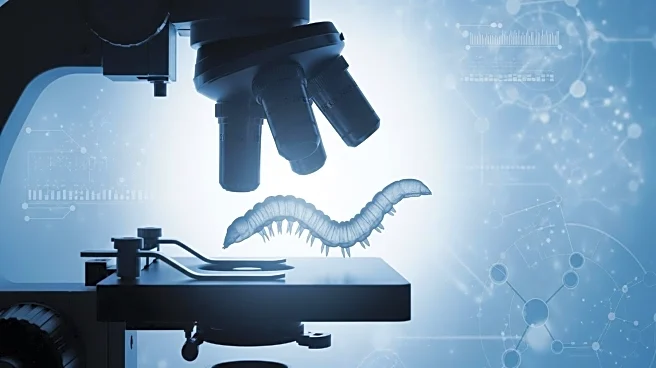What's Happening?
Researchers at the Howard Hughes Medical Institute, led by Meng Wang, have discovered a mechanism by which genetic-engineering-induced longevity in Caenorhabditis elegans can be passed down to their progeny without transferring the specific genetic modification. This study highlights how lysosomal metabolism changes, specifically the overexpression of the enzyme LIPL-4, can extend the lifespan of these worms by 60%. The research team found that even when these genetically modified worms were bred with wild-type worms, their offspring exhibited increased longevity. The study utilized chromatin immunoprecipitation and next-generation sequencing to identify that the histone variant H3.3 was elevated and methylated in long-lived worms. This discovery provides insight into the transgenerational effects of epigenetic changes, which have been observed in both humans and model organisms.
Why It's Important?
This research is significant as it sheds light on the mechanisms behind transgenerational epigenetic effects, which could have implications for understanding human aging and longevity. The ability to pass on longevity traits without direct genetic modification suggests potential pathways for influencing lifespan through epigenetic means. This could impact future research in aging, potentially leading to new interventions that promote longevity in humans. The study also emphasizes the role of lysosomal metabolism and histone modifications in aging, which could open new avenues for therapeutic strategies targeting these pathways.
What's Next?
Future research may focus on exploring the applicability of these findings to humans and other organisms. Scientists might investigate whether similar epigenetic mechanisms are present in humans and how they can be manipulated to promote longevity. Additionally, further studies could explore the potential for developing drugs or treatments that mimic these epigenetic changes to extend lifespan. The research community may also look into the ethical implications of manipulating epigenetic markers for longevity.
Beyond the Headlines
The study raises questions about the ethical considerations of using genetic and epigenetic modifications to influence human lifespan. As research progresses, there will likely be debates about the potential societal impacts of extending human life, including issues related to population growth, resource allocation, and quality of life. Additionally, understanding the transgenerational effects of epigenetic changes could lead to discussions about the responsibility of individuals to manage their health and lifestyle choices, knowing they could impact future generations.











